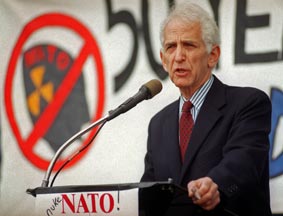Blowing the lid on deception

Daniel Ellsberg wanted to know why John F Kennedy had increased the number of US troops in Vietnam when it was obvious that their presence there was not the solution. After a two-year stint in Vietnam, Ellsberg was asked to participate in a top-secret US Department of Defence study on Vietnam. This gave him access to documents which proved the American people had been consistently misled by Kennedy and Nixon on Vietnam.
Ellsberg did not know what to do. He started attending war resistance meetings incognito. At one peace vigil, he found the testimonials from US soldiers so powerful that he broke down in tears and spent most of the evening in the bathroom crying, thinking, ‘We are eating our young.' He resolved to do whatever he could to stop the war.
He used a photocopier in a friend's office to copy the 47 volumes of what were to become known as the Pentagon Papers. Every day he worked for the US government, every night he spent photocopying 7,000 pages of ‘presidential deception'.
Still unsure how best to progress, he met with senators who were against the war. They did not want to help. With no other option left, he went to the New York Times. They set up a special unit in a hotel and spent three months going through the papers. They did not tell Ellsberg. Twenty-two months after Ellsberg had started copying the papers, he was told the story would lead the next day's New York Times and the content of the papers would be printed daily thereafter.
Ellsberg went on the run. Nixon started a witch-hunt for him and for the New York Times. Ellsberg continued to leak information over a 28-day period before handing himself in. He hoped the information would help end the war. He faced a 115-year prison sentence for treason and 12 other felony charges. White House agents broke into his psychiatrist's office and into the Watergate Hotel, which started a series of events that led to Nixon's downfall and Ellsberg's acquittal.
Daniel Ellsberg, now 75, lives in New York and is an anti-war campaigner. “Don't wait until the war has started and bombs are falling and thousands have died. Go to prison. Go to the press with documents,” he recommends to others who have information on unnecessary invasions.
Ellsberg tells a great story of realisation, of courage and truth-telling. Alan Torney's interview with him is the third instalment in this second series of Whistleblowers (RTÉ Radio 1, Monday 8.02pm). Torney allows the subjects to tell their stories, uninterrupted, in their own words, which are then edited with archive footage and minimum commentary.
Last week, Mukesh Kapila told of how he witnessed genocide in Darfur while the world refused to act. Next week Sherron Watkins, the one Enron employee who warned of the imploding accounting scandals, talks. To gain access to such international and high-profile people is a real achievement for Torney. This is radio at its best. One simple suggestion, though. What about finding a few more Irish whistleblowers? God knows we need them.π
